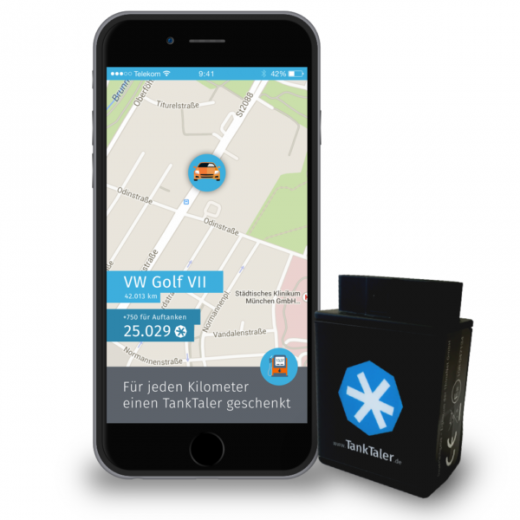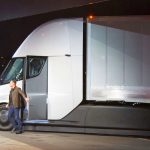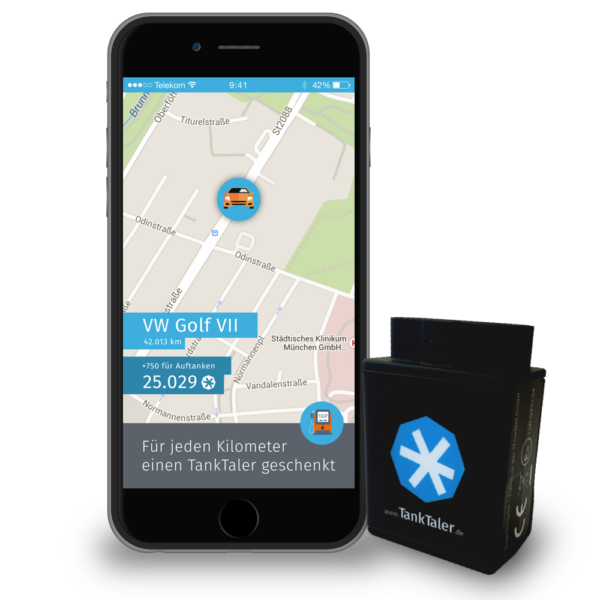TankTaler wants to Tesla up your tired old ride
TankTaler wants to Tesla up your tired old ride

It’s easy with the evolution towards cars that are not only connected but autonomous vehicles to forget that such technologically enhanced vehicles are preceded by cars that have operated with perfect functionality for many years despite their lack of technical prowess.
Up until now, the owners of such cars have been faced with two options: remain “disconnected” or upgrade to a new car. Thanks to a Munich-based IoT company called ThinxNet, car owners with model years from 2001 onwards can get some of the technological advances afforded to those with newer car models.
The system is called TankTaler, and includes a hardware dongle — which includes a SIM card and GPS monitor — and a corresponding smart phone app. The dongle plugs into the OBD II interface, the port located below the steering wheel that mechanics access to get diagnostic information about your car.
Once paired with the app, the car owner can get a range of information about the car, This includes battery and fuel levels, details of travel routes and driving behaviour, anti-theft protection and more. We spoke with Regina Werner at ThinxNet to learn more.
TankTaler concept actually came from the farm
TankTaler was launched in November 2015 after the ThinxNet founders pivoted from their original plan to use GPS technology to track the location of cow herd on large farms in the Alps or Argentina. The dongle and app are free for participants who additionally earn bonus points called TankTaler which can be redeemed in gift vouchers — from gas stations or retailers like Amazon around Germany with loyalty program with cash-back system.
The TankTaler device offers a range of functionalities, that interest different people in different ways. Werner explained:
“Some users want really simple features, for example, people who live in the cities often do not have a private parking lot, hence they spend hours looking for a place to park their car – and thus always park at different sites. Additionally, they often share cars. This means they never know where their car is parked. Then there’s tech driven people who are super interested in the statistics around the car such as the driving behaviour, how harsh they are breaking, how much they’re accelerating and the distances they’ve travelled. Then you have people that like using TankTaler as they like to save money”.
Currently, they have about 25,000 customers, “the largest private fleet in Germany,” mainly in Munich and Cologne. They generate revenues through partnerships with various companies including gas stations, garages, car dealerships, restaurants and retail chains; McDonald’s and IKEA are both partners.
Discount benefits…and reclaiming your data
That means TankTaler users get discounts and other benefits. You can imagine there being some attractive connections with car insurances also. However, ThinxNet’s work is underpinned with the idea of personal “sovereignty” over personal data. Werner notes that:
“Right now most car manufacturers are collecting data without drivers being aware of it and trying to earn money out of it. We believe that drivers should own their data and decide what to do with it, according to what will directly benefit them”.
It also benefits people who use their car for business. As Werner explains:
“When you use your car also for business you get tax deductions according to your mileage but you have to document your journey in a log book. Through TankTaler people can download all their trips as a spreadsheet. By comparison, a competitor’s product offering only this feature costs over €700”.
TankTaler also enables payments
The dongle works without the need for a mobile phone connection. This has meant that it is possible to track the cars location precisely and get help in the event of a break down or accident as the device is connected to an emergency call number. This is akin to the functions of the latest BMW motorcycles and is expected to be made mandatory in all new cars by 2018.
ThinxNet are working to join forces with automobile clubs to enable the tracking of broken down cars with the app able to send their precise location. As the dongle has its own battery, it can send data even if the dongle is removed by a car theft or the car battery gets disconnected in the case of a crash.
Perhaps one of the most innovative uses of the TankTaler is in one touch payments at gas stations. Users can fill up, tap the app, and get back in their car. They are then sent a monthly bill to pay. This is very innovative for Germany where you normally have to pay inside the shop and many retailers favor cash over other payment methods. Werner notes:
“Gas station owners are sometimes 60-plus (years old) and hard to explain the technology to, but when you show that people can pay through the app, people think that’s really revolutionary. Some owners are like ‘This is the biggest revolution in the last 40 years in the industry.’”
But perhaps some of the more indirect benefits of TankTaler are through big data analysis.
The device has the potential to track large groups of drivers throughout concentrated areas and thus is able to measure the popularity of driving routes and determine weak spots where a road needs to be repaired or there’s a spot with high rates of accidents.
This could potentially include information for smart city planners such as where to situate traffic lights and how to control them with the help of real time data to get a smooth flow of traffic. It can also help developers determine where gas stations should be built according to traffic flow.
ThinxNet intends on branching up to other parts of Europe in the upcoming months, paving the way for enter into other countries around the world. The irony of such an enterprise as this is that as connected cars become more normal, they will gradually be placing themselves out of a job, but for now, that time is a long way off.
The post TankTaler wants to Tesla up your tired old ride appeared first on ReadWrite.
(189)













